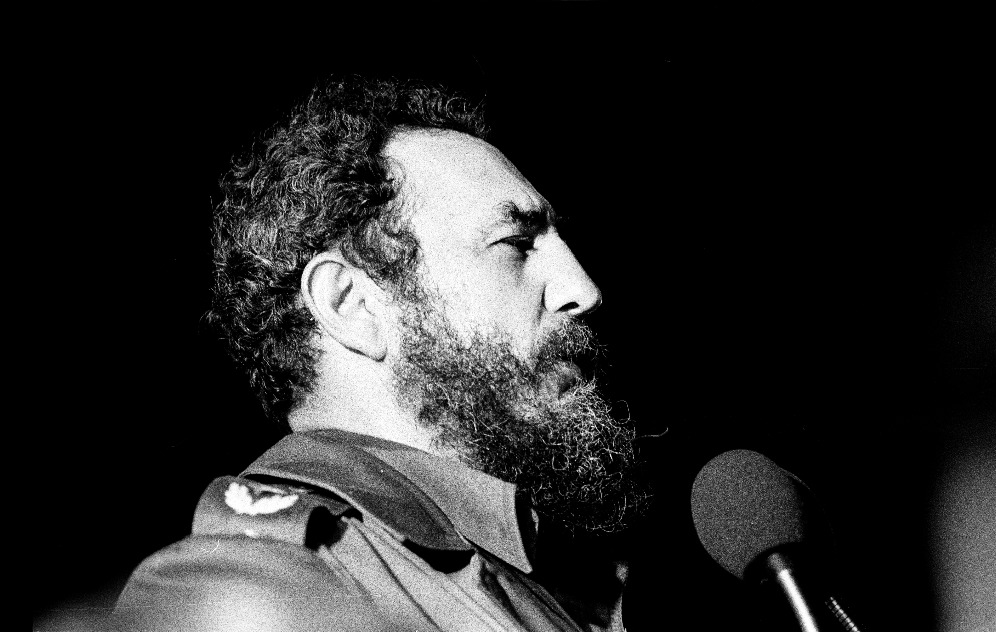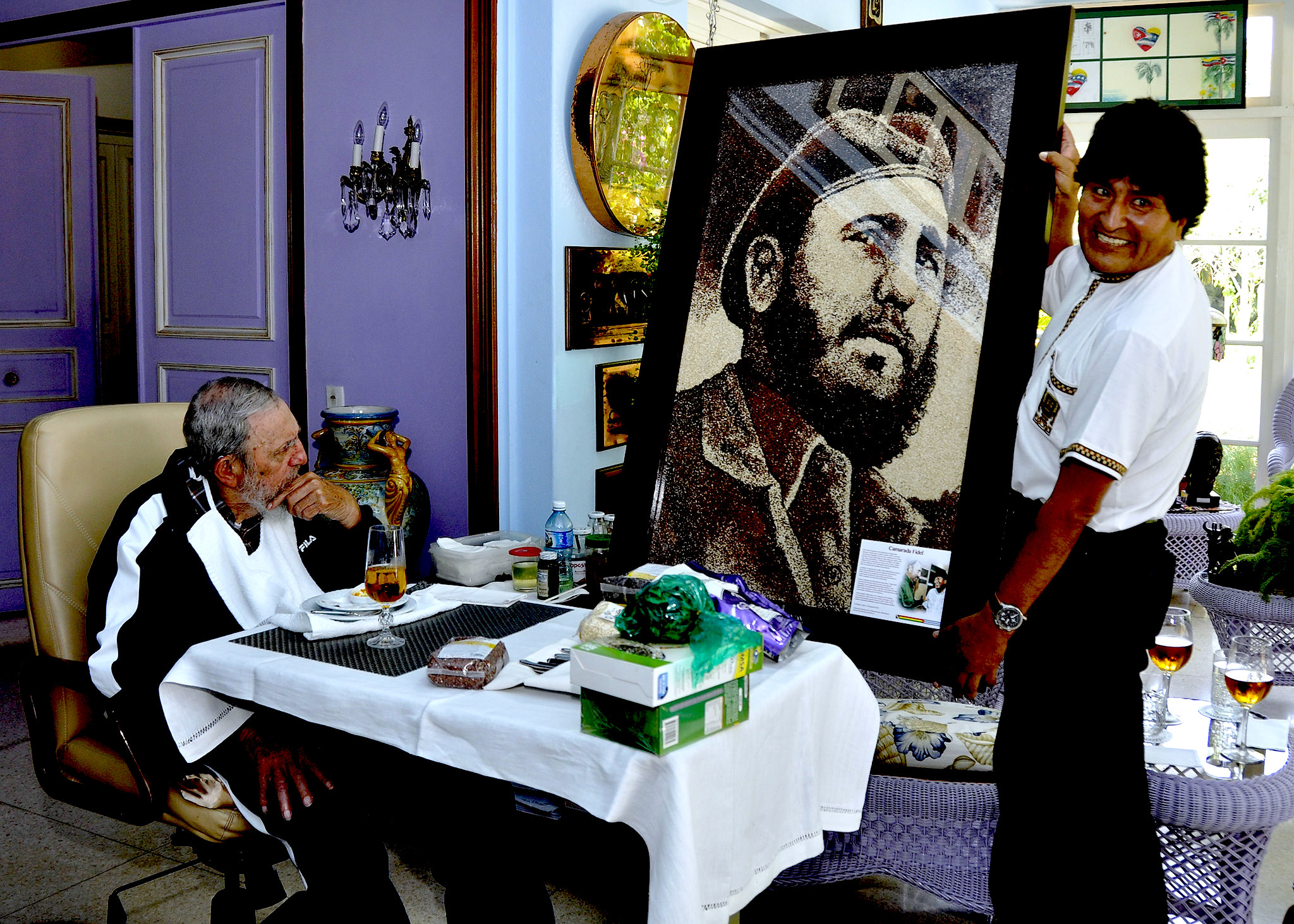British diplomats advised the C.I.A. on the impact of killing the Cuban leader, just as the U.S. was preparing a massive covert action campaign against him, John McEvoy reports.

Fidel Castro speaking in Havana, 1978. (Marcelo Montecino, CC BY-SA 2.0, Wikimedia Commons)
By John McEvoy
Declassified UK
 Fidel Castro’s secret service chief once estimated that 634 attempts were made against the Cuban leader’s life.
Fidel Castro’s secret service chief once estimated that 634 attempts were made against the Cuban leader’s life.
From exploding cigars to poisoned pills, Washington’s campaign to assassinate Castro remains an infamous case of Cold War covert action.
The presence of a revolutionary government in Cuba, just 90 miles off the coast of Florida, was intolerable for the U.S. government.
What is less well known is that Britain collaborated with Washington’s anti-Castro operations in the early 1960s.
A Foreign Office document, classified for six decades and only recently released at the National Archives, reveals British diplomats discussed the “disappearance” of Castro with the C.I.A.
In November 1961, Thomas Brimelow, a high-flying British diplomat in Washington, went with his colleague Alan Clark to meet the C.I.A.
Clark, who was visiting America from his post at the British embassy in Havana, offered U.S. intelligence a window into Cuba — a country the State Department had pulled out from.
After opening statements, the C.I.A. men cut to the chase, asking Clark “whether the disappearance of Fidel Castro himself would have serious repercussions” in Cuba.
Brimelow’s minutes of that meeting, marked “secret and personal,” show the British duo did not protest the unsubtle allusion to Castro’s assassination.
Clark responded that “Raoul Castro had been nominated as Fidel’s successor” and “he might succeed in taking Fidel’s place if adequate time were allowed.”
More frankly, Clark added: “If Fidel were to be assassinated, then it was less certain that there would be a smooth takeover. The [state] apparatus, which was apparently strong enough to cope with a gradual changeover, might not cope with a sudden crisis.”

Aug. 13, 2015: Fidel Castro, left, on his 89th birthday, with Bolivia’s Evo Morales. (Cubadebate, Flickr, CC BY-NC-SA 2.0)
The revelations raise fresh questions about how much Britain knew of Washington’s secret efforts to topple Castro.
The subversive discussion came months after the White House had cut off diplomatic relations with Havana and attempted a failed invasion at Cuba’s Bay of Pigs.
Just days after the U.K.-C.I.A. meeting, President John F. Kennedy authorised Operation Mongoose – a secret program to remove Castro by any means necessary.
The following year, Clark became first secretary at the British embassy in Washington. Brimelow ultimately went on to run the Foreign Office and receive a life peerage.
‘Most Impressed’
While the U.K. was generally sympathetic to the White House’s goal of removing Castro, British officials were more critical of U.S. strategy — most pointedly during the botched Bay of Pigs invasion.
Diplomatic relations between the U.S. and Britain also soured over the issue of sanctioning Cuba throughout 1962.
Clark was not exclusively dismissive of the Castro government. At the C.I.A. meeting, he argued that “the revolution had brought some appreciable good to a large number of people,” adding that “the people who had thus benefited did not yet realise the price that they were paying and would have to pay.”
Nonetheless, declassified files show that the British embassy in Havana continued to share intelligence with Washington on the military, political and economic situation in Cuba.
In January 1962, Britain sent a report to the Pentagon on a military parade in Havana, replete with sketches of Cuba’s military apparatus.
It was “largely based on our own direct observations; we had the Ambassador and Head of Chancery on the stands, three members of the staff in the crowds lining the route and two more watching the proceeding on television,” one British cable noted.
The Americans were appreciative. “This is just to say how very grateful the Pentagon are for the excellent reports… about the military parade. They are most impressed by the effort put into it and the detailed results you all obtained,” another telegram shows.
In March 1962, the Pentagon insisted once again “how grateful they are for all the previous information on the military situation in Cuba.”
Months later, the U.S. outlined “priority targets” for Britain in its gathering of military information in Cuba.
“Almost all of these ‘targets’ are in the Havana area, and they have been selected as they are almost all in areas which members of the Embassy might be able to visit,” wrote one British official following a top-secret discussion with the Pentagon.
The Foreign Office declined to comment on the revelations.
John McEvoy is an independent journalist who has written for International History Review, The Canary, Tribune magazine, Jacobin and Brasil Wire.
This article is from Declassified UK.

Interesting isn’t it: through all the incursions, interventions and invasions Washington has carried out down through the years, JFK’s pledge not to invade Cuba has been honored? Republicans, Democrats, liberals and conservatives, all presidents and administrations since ’62 have not sent the American military into Cuba. I wonder why……….
The article omitted that Castro was brought to power aided by the US elites. Worldwide the wellmeaning progressives cant digest the fact that the anglosaxon aristocracy supports collectivism while officially sometimes perform an act of virulant anticommunism.
All the longlasting nominally communist systems were likewise aided to power by them.
If one sincerely wishes to reform or otherwise change the way the world operates one needs to absorb the truth and not indulge in ideological interpretations of what ‘could’ be true.
No doubt more game is afoot.
During the Cuban Missile Crisis of October 1962, Kruschev explained that the Soviet missiles there were not only to balance the ICBMs the US had installed in Turkey, but also to protect Cuba after the failed US Bay of Pigs invasion.
Very likely they knew that the US CIA assassination schemes in Cuba continued. It appears likely that they never stopped.
Did the US learn its unsavory behavior from Germany or from Britain?
Definitely Britain except Americans are a bit more crude. Britain has been the most treacherous nation.